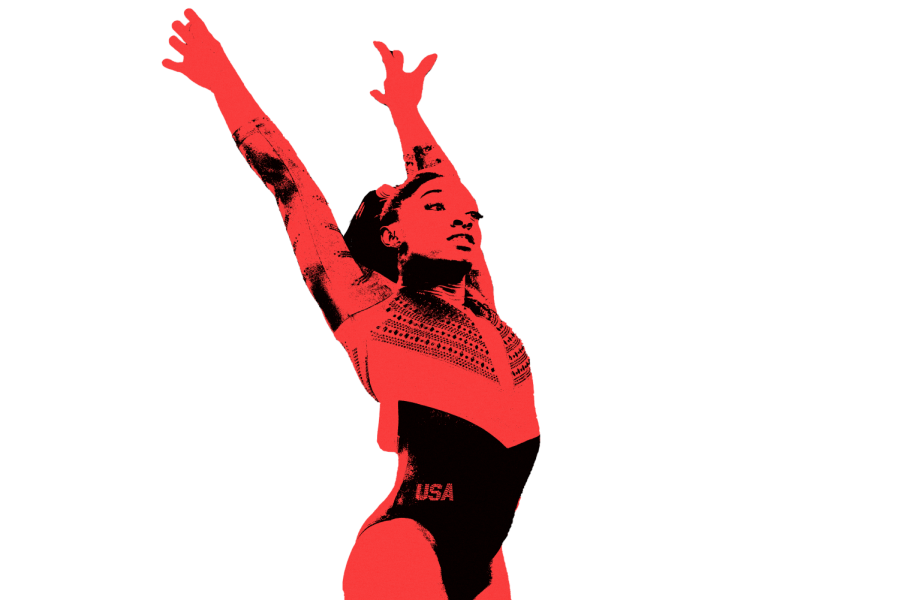Wealth and Fame Can’t Solve the Mind: Pro Athletes Speak Out About Mental Health
(Graphic by Piper Armstrong | The Daily Utah Chronicle)
September 29, 2021
When Kevin Durant misses a season due to a torn achilles tendon, nobody bats an eye. When an MLB pitcher undergoes Tommy John surgery and loses 18 months to recovery, it’s just part of the game. Or when a linebacker, seemingly in his prime, retires citing concussion and CTE concerns as Chris Borland did in 2015, he is praised for choosing his future health over a brief career in the NFL.
An obviously-diagnosable injury is much easier to wrap our minds around than the vague and wildly varied nature of managing and improving our mental health. For that reason, when Simone Biles opted out of five of the six finals at the Tokyo Olympics in July, it prompted conversation.
Was the greatest gymnast of all time letting her country down on the world’s biggest stage? Can’t she tough it out until the Olympics are over? But there’s one question I didn’t hear nearly enough: is Simone okay?
“We also have to focus on ourselves, because at the end of the day, we’re human, too,” Biles said to The Associated Press. “We have to protect our mind and our body, rather than just go out there and do what the world wants us to do.”
Biles isn’t alone. A number of athletes have become more outspoken in recent years about mental health being as valuable to performance as physical health.
In 2018, longtime NBA player DeMar DeRozan tweeted “This depression get the best of me…” prior to a candid interview with the Toronto Star about the anxiety and depression he has experienced since childhood. DeRozan’s story then inspired fellow NBA star Kevin Love to share his own experiences in an essay called “Everyone is Going Through Something” for The Players’ Tribune.
The two detailed their experiences in brutal honesty, Love being an excellent example of how visible success can’t always tame the demons inside. From 2015-18, Love’s Cleveland Cavaliers appeared in the NBA Finals four consecutive seasons, winning the 2016 title. Yet he continued to battle depression and self-confidence problems throughout the run.
Biles, a four-time Olympic gold medalist and 19-time World Championship gold medalist, experiences similar struggles. The toll of “being the head star of the Olympics” wore on Biles to the point where she had to choose her mental health over a medal.
“Physically, I feel good,” Biles said on NBC’s “Today” show after withdrawing from competition. “Emotionally, that kind of varies on the time and moment.”
The decision made by Biles came not long after Naomi Osaka, at the time the No. 2 ranked women’s tennis player in the world, withdrew from the French Open, citing concerns for her well-being.
Osaka recently returned to WTA competition in early September at the U.S. Open. After she fell to 73rd-ranked Leylah Fernandez, she held an emotion-filled press conference where she spoke about her recent battle with mental health.
“I feel like for me, recently, when I win, I don’t feel happy. I feel more like a relief. And then when I lose, I feel very sad. I don’t think that’s normal.” Osaka finished by saying, “Yeah, I think I’m going to take a break from playing for a while.”
What do each of these stories have in common? Mental health is a serious issue that impacts people across all walks of life. Nobody is exempt because of money or fame. Even at the top of their professions, these athletes have the courage to fight a stigma, and push back on the taboo topic of mental health in professional sports.
Too long have these things been kept quiet and athletes encouraged to “be tougher” and “not show weakness.”
NBA champion and Association logo Jerry West detailed his fight with mental health in a book after he retired, but more and more, athletes like Michael Phelps, the WNBA’s A’ja Wilson and those mentioned above have begun to address the problem while still active, removing the stigma of weakness that once attached itself to talking about mental health.
Hopefully, with their examples, more people will become comfortable with being vulnerable.
“I wouldn’t change anything for the world,” said Biles, who left Japan with a silver medal from the team competition and an individual bronze on balance beam. “I gave an outlet for athletes to speak up about their mental health and their well-being and learn that you can put yourself (as a person) first before the athlete.”










John • Oct 1, 2021 at 9:57 am
Really, Brian? I heard a lot of stupid things but mostly on Fox News (as usual). But I heard plenty of people asking “is Simone ok” also. We’re all aware of mental health. A little original insight would go far in the world of journalism today.
harold a maio • Sep 29, 2021 at 9:34 pm
—-Even at the top of their professions, these athletes have the courage to fight a stigma, and push back on the taboo topic of mental health in professional sports.
Actually, each of the olympians who has spoken out has rejected the stigma.
And they are influencing us to do so as well.
Join in.
Harold A Maio, retired mental health editor